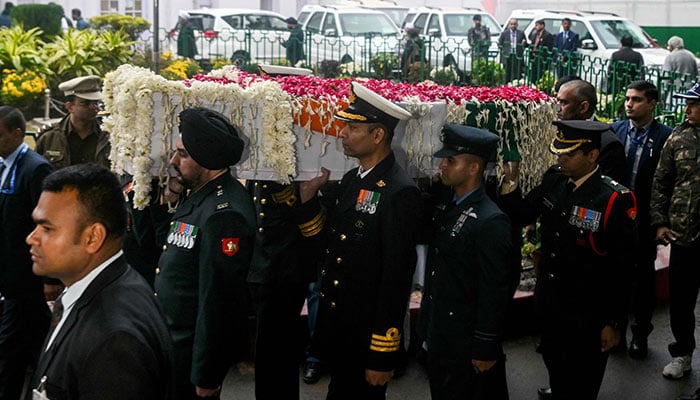Sports
Only 5pc children receive good quality education: report
字号+ Author:Smart News Source:US 2025-01-11 23:43:12 I want to comment(0)
ISLAMABAD: Apart from the challenge of around 26 million out-of-school children, Pakistan’s education system is rife with the quality issue as only five per cent children are receiving good quality education. Moreover, only 12pc of the eligible age group has currently access to higher education, according to the education ministry’s “National Education Policy Development Framework 2024” launched on Monday. “Roughly, not more than 5 per cent of children are receiving good quality education. No province can claim to be free of these educational crises. Given the centrality of an educated workforce in economic and social development, it can be claimed that these shortcomings contribute to the overall low ranking in the human development index (HDI). Pakistan ranks at 164 out of 193 countries,“ read the framework launched by Minister for Education and Professional Training Dr Khalid Maqbool Siddiqui at a ceremony. National Education Policy Development Framework also points out challenge of stunting The event was organised by Pakistan Institute of Education (PIE) — a subsidiary of the education ministry. The country has no updated education policy as it has national education policy of 2009. In 2018, an education framework was launched, and now this document, according to the education ministry, will be a guiding principle for development of provincial education policies. Besides highlighting poor quality and out-of-school children, the framework also pointed out the challenge of stunting, stating that about 40pc children were irreversibly stunned by the age of five, while despite restrictions the practice of corporal punishment continued. It said: “Bullying and child abuse are neglected areas.” The framework stated that in recent years the higher education sector in Pakistan had seen rapid expansion, but the changing global landscape and national requirements demanded a deeper evaluation of its needs. It said higher education sector continues to face several challenges that hinder its ability to deliver high-quality education, perform cutting-edge research, and contribute effectively to the socio-economic development of the country. “The primary need is to improve the quality of education. Many universities struggle to provide education that is relevant to modern industries and global standards. There is a critical need to enhance the quality of teaching, improve learning outcomes, and ensure that research outputs meet global benchmarks. Another key need is increased access to higher education. Despite the expansion of educational institutions, only 12pc of the eligible age group currently has access to higher education, leaving a significant gap in participation,” it said. To address quality issues in higher education, the Quality Assurance Framework needs to be streamlined based on ground realities and implemented effectively. “Pakistan’s research output, particularly in critical areas such as science, technology, engineering, and mathematics (STEM), remains below global standards. “There is an urgent need to invest in research facilities, foster collaboration between academia and industry, and promote innovation. Economic relevance is another vital need. Higher education institutions must align their curricula with the needs of the economy, producing graduates equipped with the skills required by modern industries.” Speaking on the occasion, Dr Siddiqui emphasised the urgency of the National Education Development Framework 2024, describing it as a vital necessity. He stressed the need to accelerate its implementation as part of the educational emergency, warning that if the younger generation is not prepared, artificial intelligence could render a billion people irrelevant. He referred to Pakistan’s indecision on the medium of instruction — whether in the mother tongue, national language or global languages. The minister called for prioritising the education of the youth in artificial intelligence, engineering, mathematics and IT. “Ignoring reality or avoiding the truth will not bring any meaningful progress,” he remarked. Dr Siddiqui lamented the lack of execution despite numerous policies, frameworks and roadmaps since 1951. He said the Ministry of Education is focused on policy formulation post the 18th Amendment, while provinces are responsible for implementation. He noted that China and India lifted 500 million and 150 million people, respectively, out of poverty over two decades. He said Pakistan’s entrenched feudal system, sustained by poverty, remains a significant obstacle. Criticising past decisions, he claimed education was feudalised rather than nationalised in 1972. He also questioned why “ghost schools” proliferated while opening new schools remained a challenging. Secretary Education Mohyuddin Ahmad Wani said the framework was developed in consultation with experts and provincial representatives. “It identifies critical issues in Pakistan’s education sector, addressing areas such as school education (from early childhood to higher secondary), non-formal education, adult literacy, higher education and technical and vocational training.” The framework outlines problems in access, quality, and equity, emphasising market-aligned technical education and diversified career pathways. Highlighting Pakistan’s poor ranking — 164th among 193 countries — he noted the literacy rate of only 62pc and 26 million out-of-school children. He underscored severe deficits in foundational skills, higher education access (limited to 12pc), and alignment with market needs. The lack of resources and challenges from Pakistan’s diversity impede policy implementation. Director General Pakistan Institute of Education Dr Mohammad Shahid Soroya highlighted the framework. Later, speaking to , he said: “Today is a big day for country’s education sector. This document was developed with the input of all stakeholders, including provinces. This document is a guiding principle and now provinces will develop their education policies. For federal capital, we will form our new education policy within three months,” he said. Education minister Balochistan Rahila Durrani (through video message) invited federal and provincial counterparts to collaborate in addressing Balochistan’s educational challenges, including teacher shortages and facility deficiencies. Parliamentary Secretary for Education Farah Naz, Special Secretary for Schools Punjab Mohammad Iqbal, Special Secretary Education Sindh Syed Junaid, Secretary Education KP Masood Ahmad, Secretary Education AJK Razzaq Ahmed Khan and others also spoke on the occasion.
1.This site adheres to industry standards, and any reposted articles will clearly indicate the author and source;
 Related Articles
Related Articles-
نئی بنگلہ دیش کی کتابیں کہتی ہیں کہ ضیاء الرحمن نے، مجیب الرحمن نہیں، آزادی کا اعلان کیا۔
2025-01-11 23:22
-
انٹرنیٹ کی خرابی عارضی بینڈوِڈتھ کے ساتھ حل ہو گئی: پی ٹی اے
2025-01-11 22:28
-
پی ٹی سی ایل نے انٹرنیٹ کی سست رفتار کے لیے سمندری کیبل میں خرابی کو ذمہ دار ٹھہرایا ہے۔
2025-01-11 21:54
-
ایپل نے سری پرائیویسی مقدمے کو ختم کرنے کے لیے 95 ملین ڈالر ادا کرنے کا معاہدہ کیا ہے۔
2025-01-11 21:18
 User Reviews
User Reviews Recommended Reads
Recommended Reads Hot Information
Hot Information- چین نے زور دے کر کہا ہے کہ اس نے کووڈ کے ڈیٹا شیئرنگ میں کچھ نہیں چھپایا۔
- انٹرنیٹ کی خرابی عارضی بینڈوِڈتھ کے ساتھ حل ہو گئی: پی ٹی اے
- انٹرنیٹ کی خرابی عارضی بینڈوِڈتھ کے ساتھ حل ہو گئی: پی ٹی اے
- پی ٹی سی ایل نے انٹرنیٹ کی سست رفتار کے لیے سمندری کیبل میں خرابی کو ذمہ دار ٹھہرایا ہے۔
- سابق صدر یون کی گرفتاری کا حکم
- ایپل نے سری پرائیویسی مقدمے کو ختم کرنے کے لیے 95 ملین ڈالر ادا کرنے کا معاہدہ کیا ہے۔
- پی ٹی سی ایل نے انٹرنیٹ کی سست رفتار کے لیے سمندری کیبل میں خرابی کو ذمہ دار ٹھہرایا ہے۔
- ایپل نے سری پرائیویسی مقدمے کو ختم کرنے کے لیے 95 ملین ڈالر ادا کرنے کا معاہدہ کیا ہے۔
- آسٹریلیا نے مارش کو ڈراپ کیا، پانچویں بھارتی ٹیسٹ کے لیے ویبسٹر کو ڈیبیو دیا
 Abont US
Abont US
Follow our WhatasApp account to stay updated with the latest exciting content












